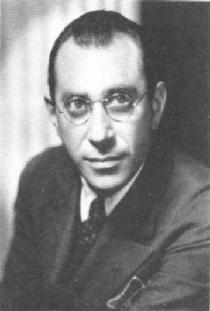Herbert Biberman
Herbert Biberman | |
|---|---|
 | |
| Born | Herbert Joseph Biberman March 4, 1900 |
| Died | June 30, 1971 (aged 71) |
| Other names | Herbert J. Biberman |
| Occupation(s) | screenwriter and film director |
| Spouse | Gale Sondergaard (1930–1971) (his death) 2 children |
Herbert J. Biberman (March 4, 1900[1] – June 30, 1971) was an American screenwriter and film director. He may be best known for having been one of the Hollywood Ten as well as directing Salt of the Earth, a 1954 film about a zinc miners' strike in Grant County, New Mexico. His membership in the Director's Guild of America, stripped in 1950, was post-humously restored in 1997.
He was born in Philadelphia, Pennsylvania, to Joseph and Eva Biberman and was the brother of American artist, Edward Biberman.[2] Biberman's pre-blacklist career included writing such films as King of Chinatown, When Tomorrow Comes, Action in Arabia, The Master Race, and New Orleans, as well as directing such films as One Way Ticket, Meet Nero Wolfe, and The Master Race. He married actress Gale Sondergaard in 1930; the marriage endured until Biberman's death. Herbert Biberman died from bone cancer in 1971 in New York City.
The Blacklist
Though he would become fanatically pro-war after Germany invaded the Soviet Union, during the Molotov-Ribbentrop pact, his outspoken opposition to U.S. Lend-Lease to the United Kingdom was so intense, the FBI suspected Biberman (who was actually Jewish) of being a Nazi.[3] In 1947, the U.S. House Committee on Un-American Activities began investigating the film industry, and Biberman became one of ten Hollywood writers and directors cited for contempt of Congress when they refused to answer questions about their Communist Party USA affiliation.
Biberman and his fellow Ten went to jail over their contempt convictions, Biberman for six months. Edward Dmytryk ultimately cooperated with the House committee, but Biberman and the others were blacklisted by official Hollywood movie studio bosses.
Biberman went to work independently after his release from jail. The result was Salt of the Earth, a fictionalized account of the Grant County miners' strike written by Michael Wilson and produced by Paul Jarrico, neither of whom were members of the Ten but both of whom were also blacklisted. Biberman died in New York City.
Salt of the Earth has been deemed "culturally significant" by the United States Library of Congress and selected for preservation in the National Film Registry. The film has also been preserved by the Museum of Modern Art in New York. Wilson, one of the blacklisted screenwriters who worked under assumed names, later won an Academy Award for a screenplay he wrote under a nom de plume, Bridge on the River Kwai.
One of the Hollywood Ten, a 2000 film chronicling his blacklisting and the making of Salt of the Earth from Biberman's point of view, starred Jeff Goldblum as Biberman and Greta Scacchi as Gale Sondergaard. The film's closing credits noted Biberman had never been removed from the old blacklist formally, and that Sondergaard had not found work in Hollywood until after her husband's death. Biberman's membership in the Director's Guild of America, stripped in 1950, was however, restored after his death.
Filmography
Herbert Biberman's filmography is recorded at the Internet Movie Database.[4]
| Year | Film | Role | Notes |
|---|---|---|---|
| 1935 | Eight Bells | dialogue director | |
| One-Way Ticket | Director | (as Herbert Biberman) | |
| 1936 | Meet Nero Wolfe | Director | |
| 1939 | King of Chinatown | Writer (story) | |
| When Tomorrow Comes | Writer | (uncredited) | |
| 1944 | Action in Arabia | Writer (original screenplay) | (as Herbert Biberman) |
| The Master Race | Writer (screenplay) (story), Director | ||
| Together Again | Writer (story) | (as Herbert Biberman) | |
| 1946 | Abilene Town | associate producer | |
| 1947 | New Orleans | Writer (story), associate producer | |
| 1950 | The Hollywood Ten | Himself | (uncredited) |
| 1954 | Salt of the Earth | Director | |
| 1969 | Slaves | Writer, Director |
See also
- The Hollywood Ten documentary.
References
- ^ 1921 US Passport Application
- ^ Description of DVD Biography of Biberman
- ^ Welky, David (2008). The Moguls and the Dictators: Hollywood and the Coming of World War II. JHU Press. p. 238. ISBN 0801890446. Retrieved October 16, 2014.
- ^ Herbert J. Biberman at IMDb
External links
- Herbert J. Biberman at IMDb.
- Review in TV Guide of biopic, "One of the Hollywood Ten."
